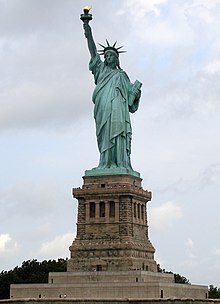
Back Vryheid Afrikaans Freiheit ALS አርነት Amharic Frēodōm ANG حرية Arabic ܚܐܪܘܬܐ ARC Llibertá AST Atiniña Aymara Azadlıq Azerbaijani اؤزگورلوک AZB
This article possibly contains original research. (October 2022) |

Liberty is the state of being free within society from oppressive restrictions imposed by authority on one's way of life, behavior, or political views.[1] The concept of liberty can vary depending on perspective and context. In the Constitutional law of the United States, ordered liberty means creating a balanced society where individuals have the freedom to act without unnecessary interference (negative liberty) and access to opportunities and resources to pursue their goals (positive liberty), all within a fair legal system.
Sometimes liberty is differentiated from freedom by using the word "freedom" primarily, if not exclusively, to mean the ability to do as one wills and what one has the power to do; and using the word "liberty" to mean the absence of arbitrary restraints, taking into account the rights of all involved. In this sense, the exercise of liberty is subject to capability and limited by the rights of others. Thus liberty entails the responsible use of freedom under the rule of law without depriving anyone else of their freedom. Liberty can be taken away as a form of punishment. In many countries, people can be deprived of their liberty if they are convicted of criminal acts.
Liberty's etymology is from the Latin word liber, from Proto-Italic *louðeros, from Proto-Indo-European *h₁léwdʰeros, from *h₁lewdʰ- ("people") (thus cognate to archaic English lede ("man, person")).[2] The word "liberty" is commonly used in slogans or quotes, such as in "Life, Liberty, and the pursuit of Happiness"[3] and "Liberté, égalité, fraternité".[4]
- ^ Stevenson, Angus; Lindberg, Christine A., eds. (2010-01-01). "New Oxford American Dictionary". doi:10.1093/acref/9780195392883.001.0001. ISBN 978-0-19-539288-3. Archived from the original on 2020-03-12. Retrieved 2023-06-02.
{{cite journal}}: Cite journal requires|journal=(help) - ^ Vaan, Michiel de (2008). Etymological dictionary of Latin and the other italic languages. Leiden Indo-European etymological dictionary series. Vol. 7. Leiden, Boston: Brill. p. 338. ISBN 978-90-04-16797-1. Retrieved 2024-08-30.
- ^ United States Declaration of Independence, The World Almanac, 2016, ISBN 978-1-60057-201-2.
- ^ "Liberty, Equality, Fraternity – France in the United States / Embassy of France in Washington, DC". Archived from the original on 2016-03-05. Retrieved 2018-07-29.